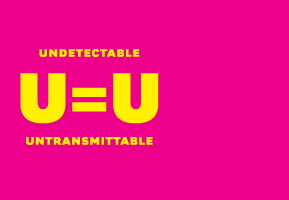Share the news! Undetectable = Untrasmittable

[et_pb_section admin_label=”section”][et_pb_row admin_label=”row”][et_pb_column type=”4_4″][et_pb_text admin_label=”Text” background_layout=”light” text_orientation=”left” use_border_color=”off” border_color=”#ffffff” border_style=”solid”]
Thanks to the advances in HIV research and medication, we can now say with confidence that people on effective treatment cannot pass on HIV. This is known as an ‘undetectable viral load’.
Here, we answer the most frequent asked questions about the U=U message (Undetectable equals Untransmittable), being ‘undetectable’ and what this means for HIV transmission.
[/et_pb_text][et_pb_text admin_label=”Text” background_layout=”light” text_orientation=”left” use_border_color=”off” border_color=”#ffffff” border_style=”solid”]
1. What is the risk of HIV of passing HIV on when you are undetectable?
People on effective HIV treatment cannot pass on the virus. That is because HIV medication (antiretroviral treatment or ART) works by reducing the amount of the virus in the blood to ‘undetectable’ levels. This means the levels of HIV are so low that the virus cannot be passed on.
It can take up to six months for some people to become undetectable from when they start treatment.
[/et_pb_text][et_pb_text admin_label=”Text” background_layout=”light” text_orientation=”left” use_border_color=”off” border_color=”#ffffff” border_style=”solid”]
2. What is ‘effective treatment’?
We are using the term ‘effective treatment’ to mean that someone is on treatment, taking it as prescribed and has what we call an ‘undetectable viral load’.
The Opposites Attract and PARTNER studies found that there remains a transmission risk within the first six months of treatment. For the HIV positive partner it may take time for the viral load to reduce to undetectable.
‘Effective treatment’ means someone has been taking it as prescribed for at least six months and has an undetectable viral load.
According to Fast-Track Cities data, 94% of people diagnosed with HIV in Victoria are on treatment. Ninety-three percent (93%) of people living with HIV who are on treatment have an ‘undetectable viral load.
[/et_pb_text][et_pb_text admin_label=”Text” background_layout=”light” text_orientation=”left” use_border_color=”off” border_color=”#ffffff” border_style=”solid”]
3. What is the evidence for this?
Scientific evidence over the last 20 years demonstrates that the likelihood of HIV transmission has much to do with ones ‘viral load’ (the amount of the virus in the blood). The PARTNER study findings published in July 2016 and the Opposites Attract study findings presented in July 2017 have provided evidence that is more definitive.
The PARTNER study looked at 888 gay and straight couples (and 58,000 sex acts) where one partner was HIV positive and on effective treatment and one was HIV negative. Results found that where the HIV positive partner had an undetectable viral load, there were no cases of HIV transmission, whether they had anal or vaginal sex without a condom.
The Opposites Attract study looked at 358 gay male serodiscordant couples from Australia, Rio de Janeiro and Bangkok. These couples performed over 12,000 acts of anal intercourse without condoms where the only protection was that the HIV positive partner had an undetectable viral load. There were no linked incidents of HIV transmission.
This is the most robust evidence to date and gives us confidence, that people on effective treatment cannot pass on HIV.
[/et_pb_text][et_pb_text admin_label=”Text” background_layout=”light” text_orientation=”left” use_border_color=”off” border_color=”#ffffff” border_style=”solid”]
4. Is this a cure for HIV?
Being ‘undetectable’ is not a cure, as the virus is still present. However, effective treatment does mean that you can have a normal life expectancy and cannot pass on the virus to others. There is no reason why HIV should stop you living, working, dating or starting a family as with anyone else.
[/et_pb_text][et_pb_text admin_label=”Text” background_layout=”light” text_orientation=”left” use_border_color=”off” border_color=”#ffffff” border_style=”solid”]
5. Can an undetectable viral load change over time?
The presence of other sexually transmitted infections (STIs) can potentially affect viral load.
HIV treatment can only be successful if you have access to it and are taking it as prescribed.
Stigma can be a barrier to people accessing treatment, and that is why this message is so important – it will help encourage adherence to medication. We know that if you take effective HIV treatment as prescribed and have an undetectable viral load, you cannot pass on HIV.
If someone’s ability to take their tablets every day changes for any reason (for example due to changes to circumstances or lifestyle) there could be a risk of transmission.
We would always advise that if you are having any problems taking your medication, for any reason, then you discuss that as soon as possible with your HIV doctor, GP or peer support worker.
[/et_pb_text][et_pb_text admin_label=”Text” background_layout=”light” text_orientation=”left” use_border_color=”off” border_color=”#ffffff” border_style=”solid”]
6. Why are we getting this message out?
We want to dispel the stigma, discrimination and myths that many people living with HIV face on a daily basis. Even their employers and healthcare professionals often discriminate against, people living with HIV for fear that they are infectious. If everybody knows that people on effective HIV treatment cannot pass on the virus, we could end this stigma.
Sharing this message, undetectable equals untransmittable or U=U, will bring down HIV transmissions by encouraging more people to test for HIV and to accept treatment.
[/et_pb_text][et_pb_text admin_label=”Text” background_layout=”light” text_orientation=”left” use_border_color=”off” border_color=”#ffffff” border_style=”solid”]
7. Does UequalsU or an ‘undetectable viral load’ promote condomless sex?
In our experience, being ‘undetectable’ does not mean people completely stop using condoms. While being on effective treatment means you cannot pass on HIV, condoms are the best way to prevent other STIs. For many people, condoms will remain their preferred way for preventing HIV transmission.
This text was adapted by Living Positive Victoria from Dr Michael Brady, © Terrence Higgins Trust 2017
[/et_pb_text][/et_pb_column][/et_pb_row][/et_pb_section]